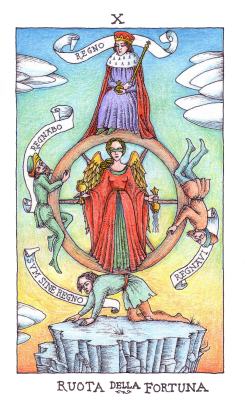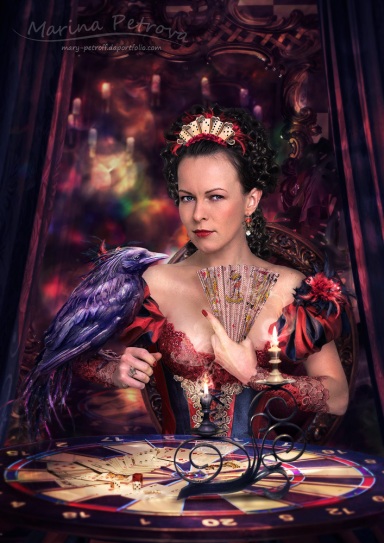“Fortuna’s themes are luck, wealth, abundance, destiny and success. Her symbols are a wheel and cornucopia. Fortuna, whose name means ‘she who brings’, is the keeper of our destiny and the guiding power behind all fortunate turns of events. She stands on top of Fortune’s wheel, steering us toward success and victory all year long.
Who of us couldn’t use a little of Fortuna’s assistance with tax day on the horizon. For a little extra cash, dab your automobile’s, bike’s, or motorcycle’s wheels with almond oil or pineapple juice. Symbolically, this invokes Fortuna’s help by keeping money ‘rolling’ in! Also dab your steering wheel similarly – this way you can keep a ‘handle’ on personal finances.
Romans traditionally asked Fortuna about their fate and difficult problems today, then received replies on slips of paper, often baked into small balls akin to a fortune cookie! This is fun for a gathering of people to try. Each person should write a word or short phrase on a piece of paper (all of which are equal in size). These get dropped in a bowl, and at the end of the day everyone can reach in to see what Fortuna has to say!
Wear colors that indicate to Fortuna what you need most (green for prosperity and luck, blue for victory, red for success, yellow for communication and creativity, and purple for spirituality and leadership qualities). Or, don lucky clothing and carry your lucky charms. Fortuna’s energy is already housed within them.”
(Patricia Telesco, “365 Goddess: a daily guide to the magic and inspiration of the goddess”.)
“Fortuna (equivalent to the Greek Goddess Tyche) was the Goddess of fortune and personification of luck in Roman religion. She might bring good luck or bad: She could be represented as veiled and blind, as in modern depictions of Justice, and came to represent life’s capriciousness. She was also a Goddess of fate: as Atrox Fortuna, She claimed the young lives of the princeps Augustus‘ grandsons Gaius and Lucius, prospective heirs to the Empire.
Her father was said to be Jupiter and like him, She could also be bountiful (Copia). As Annonaria She protected grain supplies. June 11 was sacred to Her: on June 24 She was given cult at the festival of Fors Fortuna.” [1]
“Fortuna was usually depicted holding in one hand a cornucopia, or a horn of plenty, from which all good things flowed in abundance, representing Her ability to bestow prosperity; in the other She generally has a ship’s rudder, to indicate that She is the one who controls how lives and fates are steered. She could also be shown enthroned, with the same attributes of rudder and cornucopia, but with a small wheel built into the chair, representing the cycles of fate and the ups and downs of fortune. Sometimes She is blind, as an acknowledgment that good luck does not always come to those who seem to most deserve it; at other times She is described as having wings, much like many Etruscan Goddesses—and indeed She was equated with the old Etruscan Fate Goddess Nortia, who was often shown winged.
The name Fortuna finds its root in the Latin fero, meaning ‘to bring, win, receive, or get’. She may have originally been a Goddess of Fertility, Who brought prosperity and success in the form of abundant harvests and offspring. Her worship in Rome traditionally goes back to the time of Ancus Martius, the 4th King of Rome, who is said to have reigned from 640-616 BCE. According to the propaganda of the time (and the Romans invented an awful lot of it to make it seem that their city had always been destined for greatness, and wasn’t just some upstart town founded by a bunch of sheep herders on some hills surrounded by malaria-infested swampland, which it was), when Fortuna first came to Rome, She immediately threw off Her shoes and discarded Her wings, announcing that She’d found Her true home and intended to never leave it.
Alternatively, Fortuna’s name may derive from that of the Etruscan Goddess Veltha or Voltumna, whose name encompasses ideas of turning and the alternating seasons. Voltumna in turn may be related to the Roman Goddess Volumna, who watched over and protected children; and both of these themes are found with Fortuna, who was often depicted with a wheel, and who was said to predict the fates of children at their births. As a Goddess of Fate Fortuna naturally had the power to foretell the future; and under Her aspect of Fortuna Primigenia in Praeneste She had an oracle, in which tablets inscribed with messages were chosen from a jar. She also had an oracular shrine at Her cult-center in Antium.
Fortuna had a very old temple in Rome on a hill between the Forum Romanum (the Roman Forum) and the Forum Boarium (supposedly the old cattle-market), near to the temple of Mater Matuta. Both temples had the same dedication day, the 10th of June, and each had a horseshoe-shaped altar before it of the earliest type. Fortuna’s temple had a very old statue of gilded wood inside, also of an archaic type; and the altar and statue indicate that Her worship dates at least to the earliest days of Rome, if She is not an earlier Goddess of the Latins.
The Emperor Trajan (97-117 CE) dedicated a temple to Fortuna, at which offerings were made to the Goddess on the 1st day of January, at the start of the New Year, probably to ensure good luck and success for the coming year. This temple was dedicated to Fortuna in all of Her aspects.
With Greek influence, Fortuna was equated to Tykhe, their Goddess of Luck and Fortune. Under the title Dame Fortune, Fortuna never lost Her power as an allegorical figure—She makes an appearance on card 10 of the Tarot Major Arcana, the Wheel of Fortune, and She is still to some extent honored today, for She features in gamblers’ prayers to ‘Lady Luck’.
She is associated with the Goddess Felicitas, the personification of happiness, and Spes, the Goddess of Hope.
Fortuna had quite a few aspects, many of which had their own holidays and centers of worship.” [2] Click here for a thorough listing at Thalia Took’s site, The Obscure Goddess Online Directory.
Sources:
Took, Thalia. The Obscure Goddess Online Directory, “Fortuna“.
Wikipedia, “Fortuna“.
Suggested Links:
Revel, Anita. igoddess.com, “Fortuna: healthy and wealthy – and infinitely wise!“.
Roman Colosseum, “Roman Festivals“.
Sacred-texts.com, “II. THE ROMAN GODDESS FORTUNA“.
Serenity. Order of the White Moon, “Fortuna“.
Tafarella, Santi. Prometheus Unbound, “The Goddess Fortuna: Thinking about Darwinian Contingency Metaphorically“.
Venefica, Avia. What’s-Your-Sign.com, “Goddess Symbols of Fortuna“.














Reblogged this on Teaching Trollope and commented:
I need this goddess lately.. still deciding what to do about my life and career. In the meantime, grading and gearing down from the semester soon.
I also added this article in the last writing on Fortuna, Tyche, and Félicitas found in the form of asteroids
🙂
Reblogged this on Wolf and Raven.